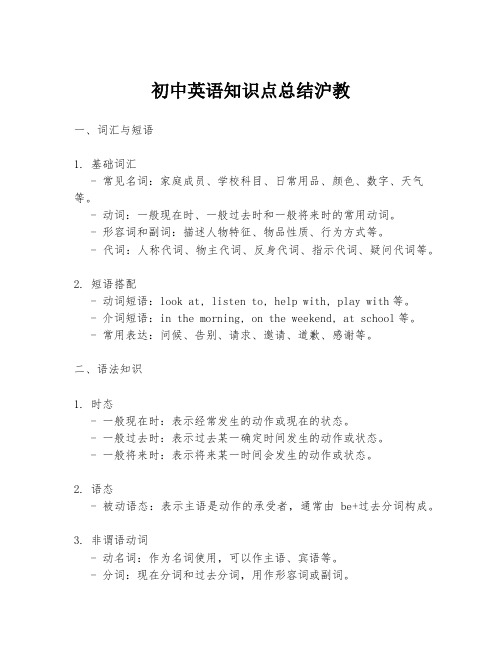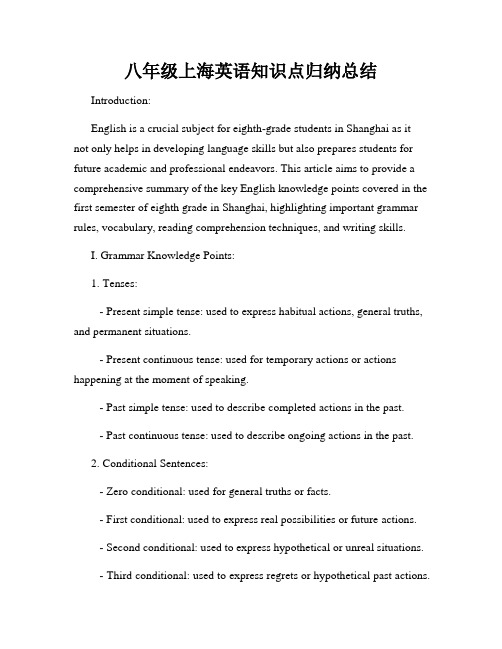上海八年级知识点总结英语
上海初二英语知识点

上海初二英语知识点初中英语是初中阶段的重要学科,下面是由我共享的上海初二英语学问点,盼望对你有用。
上海初二英语学问点:固定构造1. show sb. sth. 让某人看某物= show sth. to sb. 把某物给某人看He showed me a postcard from Hong Kong yesterday.= He showed a postcard to me from Hong Kong yesterday.类似的构造还有:give sb. sth. = give sth. to sb. 把某物给某人buy sb. sth. = buy sth. for sb. 给某人买某物2. send sb. sth. 寄给某人某物= send sth. to sb. 寄某物给某人My friends sent me a letter just now.= My friends sent a letter to me just now.3. think about/ of sth./ doing sth.考虑某事/考虑做某事He often thinks about going to Europe for vacation.4. decide on sth. 确定某事decide to do sth. 确定做某事They will decide on the case(案件) tomorrow.He decided to go sightseeing at last.5. plan to do sth. 打算做某事(过去式) planned (此时此刻分词)planningShe planned to go to Greece for vacation.vacation plans 假期打算make plans 制定打算6. forget to do sth. 遗忘去做某事forget doing sth. 遗忘做过某事7. remember to do sth. 记得去做某事= remember doing sth. 记得做过某事8. finish sth./ finish doing sth. 完成某事/完成做某事9. need to do sth. 须要做某事We need to go home early.10. leave for + 地名离开/启程去leave A for B 离开A地去B地My parents and I are leaving (here) for Beijing tomorrow.My uncle will leave Beijing for Tokyo tomorrow.12.spend意为度过、花费(时间、金钱等)其主语一般是人,常用的句式有:spendon sth.Spend(in) doing sth. 如:How long do you spend on your homework everyday?How long do you spend (in) doing your homework everyday?你每天花多少时间做作业上海初二英语学问点:短语归纳1. take the subway to = go to by subway 搭地铁2. take the train to = go to by train 坐火车3. take a bus to = go to by bus = go to on a bus 乘坐公共汽车4. take a taxi to = go to by taxi 坐的士5. ride a bike/ bicycle to = go to by bike/ bicycle 骑自行车6. walk to = go to on foot 步行7. take a car to = go to in a car= go to by car 坐汽车8. get to school 到达学校get to=arrive in/at=reach 到达(in加大地方at加小地方)9. 10 kilometers from school 离学校10公里(远)10. fromto 从到from his home to school 从他家到学校11. how (用于提问状态和交通工具) 怎样how long 用来询问时间的长度(用于提问时间段多长(时间)) 或物体的长度how often (用于提问频率) 多久时间一次how far (用于提问距离) 多远how many 用于提问数量) 多少how much(用于提问数量/价钱) 多少/多少钱how soon过多久,用来询问某事要在多久以后才能发生12. have a quick breakfast 快速地吃早餐13. leave for school 启程去学校14. the early bus 早班车15. take sb. to school 带某人去学校16. bus ride 搭公车的路程17. bus stop 公车亭18. bus station 公车站bus stop 是指小站,bus station指大的站.19. train station 火车站20. subway station 地铁站21. think of 认为22. around the world=all over the world 普及全世界22.the school bus 校车23. in North /South America 在北/南美洲in the north/south/east/west of American 在美国的北/南/东/西部24. on the school bus 乘/坐校车25. in other parts of the world 在世界上的其他地方26. the other (两者中的)另一个27. others = other (students) 其他的(学生)28. things are different 状况不同29. be different from 与不同be the same as 与一样(见后)30. make a difference 产生差异31. depend on 取决于/依靠/依靠32. go to school by boat = take a boat to school 坐船去上学33. must be 确定/必须是34. a lot more fun 更多的乐趣35. not all students并非全部的学生36. the most popular ways /means最流行的方式means of transportation 交通方式37. a small number of 小局部的A small number of students take the subway to school.小局部学生乘坐地铁上学38. a large/ great number of 大多数的☆ a number of + 复数名词作主语,动词用复数很多=many可用large/great/small 修饰,表程度。
初中英语知识点总结沪教

初中英语知识点总结沪教一、词汇与短语1. 基础词汇- 常见名词:家庭成员、学校科目、日常用品、颜色、数字、天气等。
- 动词:一般现在时、一般过去时和一般将来时的常用动词。
- 形容词和副词:描述人物特征、物品性质、行为方式等。
- 代词:人称代词、物主代词、反身代词、指示代词、疑问代词等。
2. 短语搭配- 动词短语:look at, listen to, help with, play with等。
- 介词短语:in the morning, on the weekend, at school等。
- 常用表达:问候、告别、请求、邀请、道歉、感谢等。
二、语法知识1. 时态- 一般现在时:表示经常发生的动作或现在的状态。
- 一般过去时:表示过去某一确定时间发生的动作或状态。
- 一般将来时:表示将来某一时间会发生的动作或状态。
2. 语态- 被动语态:表示主语是动作的承受者,通常由be+过去分词构成。
3. 非谓语动词- 动名词:作为名词使用,可以作主语、宾语等。
- 分词:现在分词和过去分词,用作形容词或副词。
- 不定式:to+动词原形,可以作主语、宾语、表语等。
4. 句型结构- 陈述句:用来陈述事实或观点。
- 疑问句:用来提出问题,有一般疑问句和特殊疑问句。
- 否定句:用来表示否定意义。
- 祈使句:用来发出命令或请求。
5. 从句- 宾语从句:用作动词或介词的宾语。
- 定语从句:修饰名词或代词,由关系代词或关系副词引导。
- 状语从句:表示时间、地点、原因、条件、结果等,由从属连词引导。
三、阅读理解1. 阅读技巧- 快速阅读:通过略读抓住文章大意。
- 精读:仔细阅读,理解文章细节和深层含义。
- 推理判断:根据上下文推断生词或隐含信息。
2. 阅读题型- 事实细节题:找出文章中的具体信息。
- 主旨大意题:确定文章的中心思想或主旨。
- 推理判断题:根据文章内容进行逻辑推理。
- 词义猜测题:猜测生词或短语的意思。
四、写作技巧1. 文章结构- 引言:开篇引入话题,提出文章主题。
八年级英语沪教版知识点

八年级英语沪教版知识点八年级英语是初中英语学习过程中的关键一年,学生需要掌握更多的语法知识和词汇量。
本文将介绍八年级英语沪教版的相关知识点,以帮助学生更好地准备考试。
一、基本语法1.现在进行时现在进行时表示正在进行的动作或状态,在句子中一般使用“be+动词-ing”的形式来表示,如:I am reading a book.(我正在读一本书。
)He is watching TV.(他正在看电视。
)2.过去进行时过去进行时表示过去某时正在进行的动作或状态,在句子中一般使用“was/were+动词-ing”的形式来表示,如:I was studying when she called me.(她给我打电话时,我正在学习。
)They were playing football when it started to rain.(下雨时他们正在踢足球。
)3.过去完成时过去完成时表示过去某个时间之前完成的动作或状态,一般使用“had+过去分词”的形式来表示,如:He had finished his homework before he went to bed.(他在睡觉之前已经完成了作业。
)I had seen the movie before, so I didn't want to watch it again.(我以前看过这部电影,所以不想再看一遍。
)二、词汇1.动词短语动词短语是由一个动词和它的一个或多个副词或介词短语构成的短语,如:She looks after her little sister.(她照顾她的小妹妹。
)He always gets up early in the morning.(他总是早上起得早。
)2.形容词和副词形容词是用来描述名词或代词的性质或状态的词,如:She is a pretty girl.(她是一个漂亮的女孩。
)副词是用来描述动词、形容词、副词或句子的词,如:He sings very well.(他唱歌非常好。
上海八年级上册英语知识点

上海八年级上册英语知识点一、口语表达英语在全球范围内被广泛使用,口语表达能力成为语言学习的重要部分。
在上海八年级英语中,语言学习不应只局限于书面,更应注重口语表达能力的提升。
1. 词汇量词汇量是口语表达的关键之一。
八年级上册中,学生需要掌握一定量的词汇,如动词、名词、形容词和副词等。
同时,学生需要了解每种词汇的正确词性、用法和发音。
2. 语音和语调正确的语音和语调是口语表达的重要组成部分。
八年级上册中,学生需要学习正确的语音和语调,包括元音和辅音的发音、重音的处理和语调的变化。
3. 句型和语法句型和语法结构是口语表达的基础。
在上海八年级英语中,学生需要学习各种句型结构和语法规则,并了解其正确的使用方法。
二、阅读理解阅读理解是英语学习的另一大部分。
通过阅读理解的学习,学生可以加深对英语语言的理解和应用。
在八年级上册中,学生需要掌握以下几个方面的知识点:1. 大意理解学生需要能够理解英语文章的意义和主旨。
同时,也需要学会阅读不同类型的文章,如新闻报道、故事、科技等。
2. 细节理解学生需要能够较准确地理解文章中的各种细节,并据此回答可能出现的问题。
3. 推理理解学生需要能够根据文章中的内容进行推理和判断,理解隐含的信息和意图。
三、写作技巧写作是英语学习中的重要组成部分,八年级上册中,学生需要掌握以下写作技巧:1. 语法和拼写学生需要学习正确的语法和拼写规则,并在日常写作中使用。
2. 文体和风格学生需要掌握不同文体和风格的写作方法,如日记、信件、报告等。
3. 用词恰当学生需要注意用词恰当,避免语言表达上的歧义。
总之,在上海八年级上册英语学习中,学生需要注重口语表达、阅读理解和写作技巧的综合提高。
同时,也需要多听、多读、多练习,扎实掌握所学知识点,以便更好地应用于日常生活和英语学习中。
上海初中英语知识点总结归纳

上海初中英语知识点总结归纳一、词汇与语法1. 词汇积累- 基础词汇:掌握日常生活、学习、文化、社会等方面的基础词汇,能够进行简单的日常交流。
- 主题词汇:针对不同的主题,如家庭、学校、职业、节日等,积累相关词汇。
- 词性变化:了解名词、动词、形容词、副词等词性的构成和变化规则,如复数形式、过去式、比较级等。
2. 语法结构- 时态:掌握一般现在时、一般过去时、一般将来时等基本时态的构成和用法。
- 语态:了解主动语态和被动语态的区别及转换方法。
- 句型:熟悉肯定句、否定句、疑问句、祈使句等基本句型。
- 从句:学习简单句和并列句,了解名词性从句、定语从句和状语从句的基本结构。
- 非谓语动词:掌握动名词、分词(现在分词和过去分词)的用法。
- 情态动词:了解can, could, may, might, must, should等情态动词的用法。
二、阅读理解1. 阅读技巧- 快速阅读:培养快速浏览文章,抓住主旨大意的能力。
- 精读:通过细致阅读,理解文章的具体内容和深层含义。
- 推理判断:根据上下文线索,推断生词含义和隐含信息。
2. 阅读题型- 事实细节题:定位文章中的具体信息,回答关于事实的问题。
- 主旨大意题:把握文章的中心思想或标题。
- 推理判断题:根据文章内容进行逻辑推理,得出结论。
- 词义猜测题:根据上下文猜测生词或短语的意思。
三、写作技巧1. 写作结构- 引言:开篇引入话题,提出观点或问题。
- 正文:分段阐述观点,提供支持细节或例证。
- 结尾:总结全文,重申观点或提出建议。
2. 写作类型- 描述性写作:描述人物、地点、事件等。
- 叙事性写作:讲述故事或经历。
- 说明性写作:解释概念、过程或现象。
- 议论性写作:提出观点,进行论证。
3. 写作技巧- 词汇运用:使用恰当的词汇和短语表达思想。
- 句式多样性:运用不同句型和结构,增加文章的丰富性。
- 逻辑连贯:使用连接词和过渡句保持文章的流畅和连贯。
沪科版八年级英语(全一册)知识点总结

沪科版八年级英语(全一册)知识点总结Unit 1: Greetings and Introductions- Basic greetings and responses- Introducing oneself and others- Asking and giving personal informationUnit 2: School Life- Talking about school subjects and teachers- Describing school facilities and activities- Discussing daily routines and schedulesUnit 3: Hobbies- Talking about leisure activities and interests- Describing favorite hobbies and explaining reasons- Discussing different types of hobbiesUnit 4: Transportation- Vocabulary related to different modes of transportation- Discussing means of transportation and their advantages- Giving directions and understanding transportation schedulesUnit 5: Family and Relationships- Vocabulary related to family members and relationships- Describing family members and their roles- Talking about relationships and conflictsUnit 6: Shopping- Vocabulary related to shopping and money- Discussing different types of stores and merchandise- Bargaining and making purchasesUnit 7: Health and Fitness- Vocabulary related to health, illnesses, and physical activities - Describing symptoms and seeking medical advice- Discussing healthy lifestyles and fitness routinesUnit 8: Daily Life around the World- Discussing customs and traditions in different countries- Describing interesting places to visit around the worldUnit 9: Technology and Entertainment- Vocabulary related to technology and entertainment- Discussing the advantages and disadvantages of technology- Talking about favorite TV shows, movies, and musicUnit 10: Future Plans- Talking about future aspirations and career goals- Discussing education and job opportunities- Making plans for the future and setting goalsConclusionThis document provides a summary of the key knowledge points covered in the Shanghai Science Edition Grade 8 English textbook. It covers various topics such as greetings, school life, hobbies, transportation, family, shopping, health, daily life around the world, technology, entertainment, and future plans. Each unit focuses on specific vocabulary, speaking, and writing skills to enhance the students' English language proficiency.。
英语八年级上册沪教版

英语八年级上册沪教版一、词汇。
1. 重点单词。
- Unit 1.- encyclopaedia:百科全书。
例如:I often use the encyclopaedia to look up information.(我经常使用百科全书查找信息。
)- human:人类;人的。
如:Human beings are very intelligent.(人类非常聪明。
)- dinosaur:恐龙。
The dinosaurs lived millions of years ago.(恐龙生活在数百万年前。
)- Unit 2.- number:数字;数量。
There is a large number of students in our school.(我们学校有大量的学生。
)- instruction:指示;命令。
Follow the instructions carefully.(仔细遵循指示。
)- check:检查;查看。
Check your answers before you hand in your paper.(在交卷之前检查你的答案。
)2. 词汇拓展。
- 形容词变副词。
- 一般在形容词词尾加 -ly,如:quick - quickly(快速地),careful - carefully(仔细地)。
但也有特殊情况,如:true - truly(真正地)。
- 名词变形容词。
- 加 -ful,如:help - helpful(有帮助的);加 -less表示否定,如:help - helpless(无助的)。
二、语法。
1. 一般现在时。
- 用法。
- 表示经常或习惯性的动作或状态。
例如:He gets up at six every day.(他每天六点起床。
)- 表示客观事实或真理。
The earth goes around the sun.(地球绕着太阳转。
)- 结构。
- 主语是第三人称单数(he/she/it等)时,动词要用第三人称单数形式(一般在动词原形后加 -s或 -es),如:She likes reading.(她喜欢阅读。
八年级上海英语知识点归纳总结

八年级上海英语知识点归纳总结Introduction:English is a crucial subject for eighth-grade students in Shanghai as it not only helps in developing language skills but also prepares students for future academic and professional endeavors. This article aims to provide a comprehensive summary of the key English knowledge points covered in the first semester of eighth grade in Shanghai, highlighting important grammar rules, vocabulary, reading comprehension techniques, and writing skills.I. Grammar Knowledge Points:1. Tenses:- Present simple tense: used to express habitual actions, general truths, and permanent situations.- Present continuous tense: used for temporary actions or actions happening at the moment of speaking.- Past simple tense: used to describe completed actions in the past.- Past continuous tense: used to describe ongoing actions in the past.2. Conditional Sentences:- Zero conditional: used for general truths or facts.- First conditional: used to express real possibilities or future actions.- Second conditional: used to express hypothetical or unreal situations.- Third conditional: used to express regrets or hypothetical past actions.3. Passive Voice:- Formed using "be" + past participle of the main verb.- Used to emphasize the action or the receiver of the action.4. Reported Speech:- Direct speech: repeating someone's exact words.- Indirect speech: reporting someone's words without using quotation marks.II. Vocabulary:1. Word Formation:- Prefixes and suffixes: adding affixes to base words to change their meanings (e.g., un-, dis-, -ful, -less).- Compounds and collocations: combining words together to form new meanings (e.g., blackboard, make up).2. Synonyms and Antonyms:- Synonyms: words with similar meanings.- Antonyms: words with opposite meanings.3. Idioms and Phrases:- Commonly used idioms and phrases in daily conversations and written English.III. Reading Comprehension Techniques:1. Skimming: quickly reading through the text to get a general understanding of the main idea.2. Scanning: searching for specific information or keywords in the text.3. Inference: drawing conclusions based on the information given and prior knowledge.4. Predicting: making educated guesses about what might happen next in the text.IV. Writing Skills:1. Paragraph Structure:- Topic sentence: introduces the main idea of the paragraph.- Supporting sentences: provide information or examples to support the topic sentence.- Concluding sentence: summarizes the main idea or makes a final statement.2. Narrative Writing:- Using descriptive language to create a vivid story.- Incorporating dialogue to make the writing more engaging.3. Persuasive Writing:- Using reasons, evidence, and rhetorical devices to persuade the reader.- Structuring arguments logically and presenting counterarguments.Conclusion:This article has provided a concise summary of the key English knowledge points covered in the first semester of eighth grade in Shanghai. By focusing on grammar rules, vocabulary, reading comprehension techniques, and writing skills, students can enhance their overall English proficiency and excel in their academic studies. Continuous practice and application of these knowledge points will undoubtedly contribute to students' success in English language learning.。
- 1、下载文档前请自行甄别文档内容的完整性,平台不提供额外的编辑、内容补充、找答案等附加服务。
- 2、"仅部分预览"的文档,不可在线预览部分如存在完整性等问题,可反馈申请退款(可完整预览的文档不适用该条件!)。
- 3、如文档侵犯您的权益,请联系客服反馈,我们会尽快为您处理(人工客服工作时间:9:00-18:30)。
上海八年级知识点总结英语在初中阶段学习英语是非常重要的,因为它是一种全球通用的语言,对于我们未来的发展具有非常重要的意义。
在上海八年级这个阶段,学生们需要通过不断地练习和积累,掌握英语基础知识和语言技能,为高中和大学的学习打下坚实的基础。
下面是上海八年级英语知识点总结。
一、基础篇
1. 名词:如可数名词和不可数名词、单数和复数、所有格等。
2. 代词:如人称代词、指示代词、不定代词等。
3. 形容词和副词:如形容词和副词的比较级和最高级等。
4. 动词:如时态、语态、动词的分类、不规则动词等。
5. 介词:如常用介词的使用等。
1. 句型:如简单句、并列句、复合句、疑问句等。
2. 时态:如一般现在时、一般过去时、现在进行时、过去进行时等。
3. 语态:如被动语态的变化、被动语态的用法等。
4. 语气:如虚拟语气、命令语气、建议语气、陈述语气等。
5. 从句:如名词性从句、形容词性从句、副词性从句等。
三、听力篇
1. 听力技巧:如注意听力材料的节奏、语调等。
2. 能力培养:如通过听力练习提高听力理解能力。
1. 阅读技巧:如理解文章结构、读懂主旨等。
2. 阅读理解:如精读、泛读等。
五、写作篇
1. 写作技巧:如掌握常用单词、语法规则等。
2. 写作练习:如书面作文、日记等。
六、口语篇
1. 口语技巧:如提高语速、流利性等。
2. 口语练习:如参加英文演讲比赛、英语角、听力和口语小组等。
总之,学好英语需要平时不断地练习和积累,掌握好每一篇的知识和技能,才能在日后的高中与大学学习中更好地使用英语进行学习和交流。
